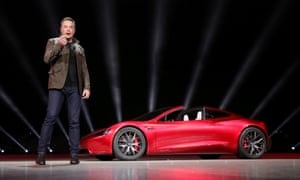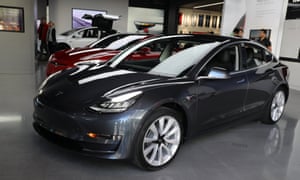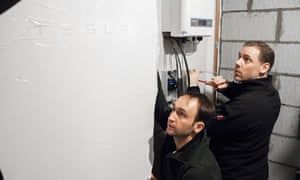Tesla boss Elon Musk pursues his most unlikely goal yet: a $55bn bonus
Some say the firm is already overvalued at $60bn. But its founder’s vision is now truly ambitious

Elon Musk unveils Tesla’s forthcoming Roadster 2 sports car in California.
Photograph: Reuters
Racy valuations for loss-making businesses are nothing new to hard-nosed Wall Street types. The dotcom boom of the late 1990s and early 2000s made a fortune for the brave souls who backed a plethora of small start-ups that are now giants of the stock market, such as Apple, Amazon and Facebook. Plenty also lost their shirts with punts on the “next big thing”.
Elon Musk knows more than most about this tricky game of risk and reward. The entrepreneur founded and sold software company Zip2 for $305m to Compaq; he also established online payment giant PayPal, which was sold to eBay for $1.5bn.
Musk’s latest venture, Tesla, has again asked investors to get the crystal ball out and to imagine what the business – a pioneer in the growth markets of electric vehicles and renewable energy storage – might become. The naysayers believe Tesla’s current $60bn valuation (around the same as General Motors) is already wildly optimistic for what is essentially a loss-making luxury car manufacturer. Musk, however, who also has a rocket and space exploration venture, SpaceX, seems to believe that not even the sky is the limit.
Even compared with the bullish financial modelling that has propelled Tesla to its current valuation, its new executive pay targets outlined last week look pretty ambitious. According to the package, Musk will continue to not take a salary but could ultimately earn $55bn in a series of stock option payments if Tesla can turbocharge its market valuation to a dizzying $650bn within 10 years.
However, Musk noted: “If all that happens over the next 10 years is that Tesla’s value grows by 80% or 90%, then my amount of compensation would be zero.”
Tesla, based in Palo Alto, California, has more than 33,000 employees worldwide and recently launched the Model 3 saloon, a more affordable “mass market” electric car that is key to its efforts to become profitable.
Until now, Tesla has struggled to ramp up production of the car, so it is no surprise to see that the proposed bonus plan no longer includes vehicle output targets, which were included in previous compensation deals.
Instead, Musk will be paid stock options in 12 tranches that vest over 10 years. To secure each tranche, Musk must hit a pair of milestones – one linked to Tesla’s market value, the other to revenue and profitability.
Every tranche depends on Tesla’s market value increasing by $50bn. If he hits all 12 targets and increases Tesla’s valuation from $60bn to $650bn, plus revenue of $175bn and earnings of $14bn, Musk’s shares bonus could pay out the full $55bn.

Tesla’s affordable Model 3 saloon is key to the company’s financial future. Photograph: Lucy Nicholson/Reuters
Christian Stadler, a professor of strategic management who researches the car industry at Warwick Business School, said: “It’s hugely ambitious. In terms of revenue, the targets are even more ambitious. At $175bn we are talking about 17 times what they had in revenue last year. Considering the biggest problem is on the operational side of the business, it makes it harder still to achieve than the market valuation.”
Musk is certainly being asked to do a lot. Tesla’s last quarter saw it score just under $3bn of revenue, but make a net loss of $619m. At one point last year, the California-based company was burning through $8,000 every 60 seconds, according to Bloomberg.
It also has a habit of missing its own production deadlines. This month, it pushed back production targets for the Model 3 for the second time.
An even bigger concern than Tesla’s own stuttering performance is that the giants of the automotive world are stirring. VW, Ford, Toyota, GM and Nissan are preparing an assault on the electric vehicle market that will see them pour billions into developing a new range of “greener” cars to replace petrol- and diesel-powered models over the next few years.
“It seems astronomic at the moment – $650bn within 10 years. I don’t think so,” Stadler said. “The fact that you have everyone else piling into this makes it much harder. The others also already have the ability to scale it. To get to that valuation, Tesla would have to be absolutely dominant in electric vehicles.”
To put it in context, only three companies had a market value of more than $650bn at the end of 2017: Apple, Microsoft and Alphabet (Google’s parent). GM’s market capitalisation is $61.5bn and Ford is worth $41bn.
Even those that have been bullish on Tesla shares express some doubts about the incentive package and stretching valuation targets. Adam Jonas, analyst at Morgan Stanley, said: “We see Elon Musk’s ambitious long-term awards plan as an aspirational marketing tool to attract talent and capital ahead of an upward inflection in competition.”
Tesla’s ambitious target implies the shares will rise by about 27% a year, a feat achieved by just a handful of large American companies in recent years, including Amazon, Priceline Group (the owner of Booking.com) and Domino’s Pizza.
Stadler believes propelling Tesla into this gilded group of success stories could be the key motivating factor for Musk – far more than any promised riches. Musk is already the biggest shareholder in Tesla and has an estimated net worth of $20bn, according to Forbes. So it would be difficult for the board to incentivise him by dangling an even bigger carrot.

Tesla’s home battery business may also be a key factor in approaching Musk’s ambitious targets. Photograph: Gareth Phillips for the Guardian
“Musk is happy to have something that makes him potentially no money because he is already wealthy. The one thing that might motivate him is that the valuation target is roughly reflective of what Amazon did, so it might motivate him to want to do better than Jeff Bezos did,” Stadler said. “However, it’s a different industry [to Amazon]. Tesla is trying to be strong in a space that is already strong.”
The true believers reckon those who see Tesla as just another carmaker are missing the point. At the moment, the solar energy storage part of Tesla accounts for just 1% of its business. But it has plans to “expand solar energy generation through Solar Roof and other solar products, and seamlessly integrate them with battery storage” and to “build out Tesla’s vehicle product line to cover all major forms of terrestrial transport”.
Stadler added: “Musk does see Tesla as a ‘vertically integrated sustainable energy company’, so it wouldn’t be surprising if he views that as the growth part.”
If Musk is right, Tesla may just confound its critics: and drive its charismatic leader to unimaginable riches.